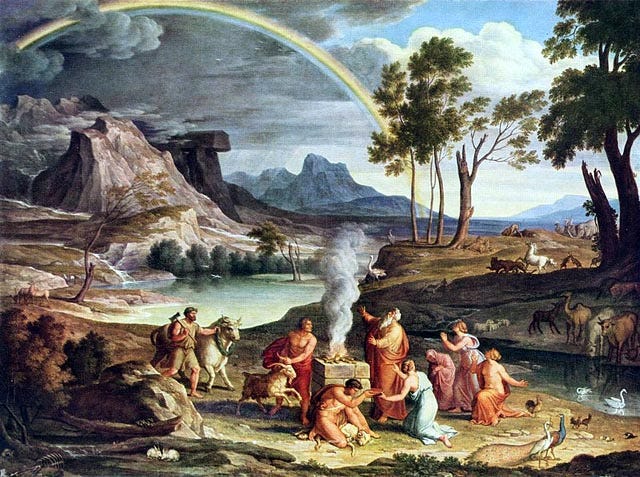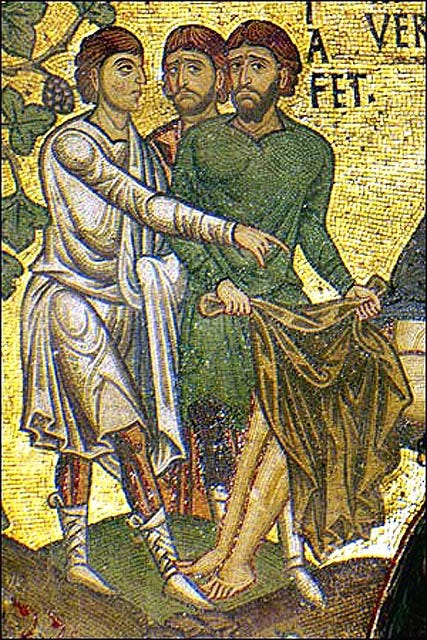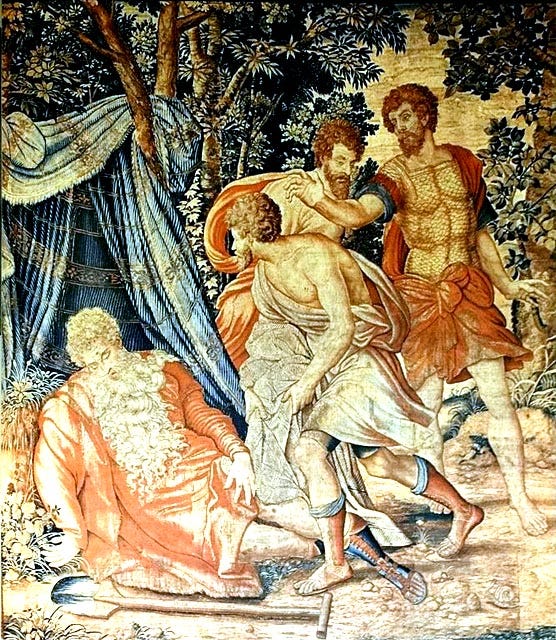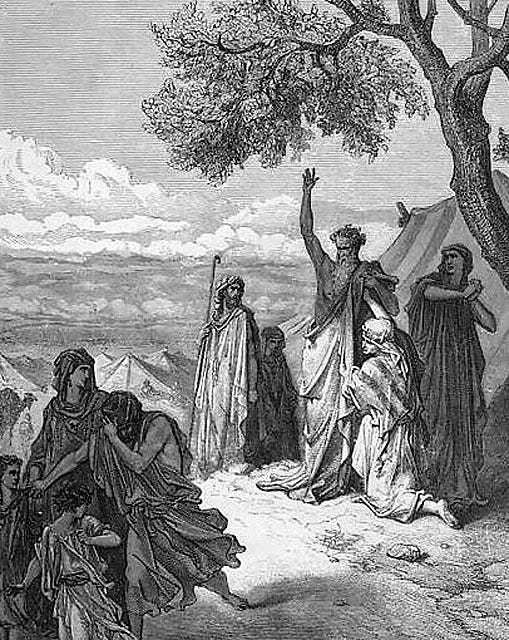Genesis 9: After the Great Flood
Some rules, a rainbow, and a little patriarchal hanky-panky
Please note: I'd LOVE to hear from you! If you have questions, comments, quibbles, or anything else to say, please feel free to use the comment section below. Thanks!

Landscape with Noah by Joseph Anton Koch (1768–1839) (Wikipedia)
Phew! I thought that flood would never be over! But here we are back on dry land, and everything is going according to plan--or is it?
Read on!
The Story
The first part of this chapter, along with the end of Chapter 8 (as mentioned there), gives us the Noahic Covenant which, among other things, re-establishes the relationship of humans to the earth, the animals, and--of course--the god. Human government over the earth is established, murder (and rare steak) is forbidden, and the god promises not to destroy the earth by water again. The rainbow proves it.
Next comes a rather bizarre episode. As I understand it, Noah got drunk and got naked inside his tent (so what?). His son Ham told his brothers, Shem and Japheth, who covered Dad with "garment" (not a blanket?) without looking. Ham gets cursed for this. Hopefully we'll be able to make sense of this below.
Noah then dies at 950.
Life and Death (9:1-7)
Now that things have settled down, the god starts laying out How Things Shall Be--for a while, at least.
The first thing he wants to do is restock the depleted world with people and animals: "Be fruitful, multiply, replenish," and so on. Let's start makin' babies! (Though I'm not sure the "fishes of the sea" really need replenishing, do they?)
Then he says, don't eat your steak rare, or eat sushi (I guess): don't eat anything with the blood still in it. Apparently cooking hadn't really caught on before then, and the god was promoting this new technology? (I don't know, just guessing here. But see the note on vegetarianism in the Footnote to 9:3.) Oh, and eat anything you want, "Every moving thing that lives shall be food for you"--a deal he'll take back later with the bacon and shellfish and whatnot (though some say Noah already knew that certain creatures were "unclean").
9:5 is a little confusing in the KJV (which I've modified heavily here), but in other translations it becomes clear(er) that what he's saying is if anyone--man or animal--kills a human being, the killer will be killed in return. So, yeah, don't kill.
Then he tells humans et al to multiply again.

Ummm, seriously? We can eat anything? (Wikipedia)
Now, let's step back a minute. The god, the main character in this book, has just wiped out almost all breathing things on the earth, save for a few specimens in his floating zoo. Now he wants the survivors to do the heavy lifting and replace what he has destroyed pronto? It seems like all of this could have been avoided somehow...
Second, he says if you kill a person, whoever "you" are--raging bull, rabid possum, malarial mosquito, or anything in between, including humans--you will be killed, apparently by the victim's brother. From a guy who has recently killed just shy of every living thing, this is a pretty blatant "Do as I say, not as I do" moment.
I guess my repugnance at this whole "flood" episode has been showing for several chapters now, but it really hits its apex here. The god has lost the moral high-ground in this story as far as I'm concerned.
But wait! There's more!
The Promise of the Rainbow (9:8-17)
As I've previously mentioned, True Believers maintain that the god never changes. Yet I sense deep regret in this passage, when he says "never again": this is the first and last time that he would use a flood to wipe out almost every creature on the earth. Furthermore, it seems that he's becoming a little forgetful. I confess: I set alarms for everything, but I'm only human. The god here says, and I'm paraphrasing, "Every time the clouds start to gather, the resulting rainbow will remind me not to wipe out nearly all living things again in a flood--ya know, in case I forget."
Most celebrate that rainbow as a "sign of a covenant," which--admittedly--the text clearly says; but I would emphasize that part at the end: "...the [rain]bow shall be seen in the cloud, and I will remember the covenant, and the waters shall never again become a flood to destroy all flesh."
That's good, right?
Noah's Sin and Its Consequences (9:18-29)
Okay, now it gets messy.
Remember Noah? One of only two men said to have "walked with God"? Who "found grace in the eyes of the LORD"? Was "a just man and perfect in his generations"? That Noah?
Well, apparently, he was fallible, too. The one holy guy in the whole shebang messed up.
And what did he do? He got drunk. And naked, but indoors. As I said above, "So what?" Some see in this an allusion to a homoerotic or even homosexual act. In these scenarios, his son Ham--who gets cursed for this, where Noah does not--either witnessed Dad breaking a taboo, or somehow participated.

The brothers deal with Dad in a detail from a mosaic in the Palatine Chapel, Palermo (Wikipedia)
This seems to me to read way too much into the story. And yet, search as I may, I cannot find any prohibition which Noah is breaking by getting drunk and naked in private. One writer suggests he was guilty of nothing more than behaving in a way unbecoming his dignity and status!
If that's so [they say], then Shem and Japheth behaved honorably by covering Dad up as quickly and discreetly as possible. Ham is guilty of gawking, and then gossiping to his brothers (and perhaps any other humans alive at the time) about what he saw. Could Noah's cursing of Ham, then, be the result of an embarrassed pique, and not any stance of righteousness at all?

Detail of Noah's Inebriety, an arras (tapestry) woven in Brussels according to Michiel Coxie's design. Part of King Sigismund Augustus's collection of Wawel arrases. (Wikipedia)
Now Ham, we are told, is the father of Canaan (9:22). Scholars disagree on who gets cursed: is it Ham (called in 9:24 Noah's "younger son")? Or was it his son, Canaan? (In 9:25, Noah says, "Cursed be Canaan"; and in 9:26 and 27, "Canaan will be [Shem's] servant"--twice.) In fact, Ham is last mentioned in this chapter--by that name--in 9:22.
The source of the confusion, methinks, is that Canaan is not a person here, but a people. We'll get into the tree of Noah's descendants next week, but in summary: Ham is the father of Cush (Ethiopia), Egypt, and Canaan. We might have expected that Canaan would be related to Shem, as the Canaanites were Semitic (Shemitic--get it?), but the ancient authors of these texts were neither philologists nor geneticists. As Egypt had interests in Palestine of the time, Hamitic they were, as far as the writers of Before the Common Era were concerned. (The belief that the Israelites and the Canaanites were not close cousins would also make it easier to wipe them out, as we'll see them do in the Book of Joshua).

Drunkenness of Noah from the Biblia Pauperum, c. 1395-1400, in the British Library (Wikipedia)
Ham, by the way, was also thought to be the father of the inhabitants not only of Africa, but of Arabia and Mesopotamia as well. His brother Shem was the father of Abraham and the Israelites. (Never mind that the Arabs are assigned to Ham, and that Arabic is also a Semitic language.) And Japheth--whooo boy! Some see him as the father of the Greeks, and thus all "Caucasian" Europeans, as well as all of the other Indo-Europeans, including the Iranians and Indians.
Do you know the old debunked "Three Race Theory"? In that antiquated system, all humans are either Caucasoid, Negroid, or Mongoloid, or some blend of these. This is like that. Shorthand:
Ham: Africa (but not Sub-Saharan--Black--Africa, which may have been unknown to the Bible writers);
Shem: Asia (but essentially Asia Minor, not East Asia, again probably unknown); and
Japheth: Europe (but only nearby, and extending north around to maybe Iran).
We'll take another swing at these "family ties" in Chapter 10, but germane here is the idea that Ham was cursed: White Supremacists of various stripes have used this "Curse of Ham" to justify enslaving Black Africans, an idea which Isaac Asimov in his Guide to the Bible calls "the purest piffle." I vehemently agree.

Noah curses Ham by Gustave Dore (Wikipedia)
So, the "curse" says: "Blessed be the LORD God of Shem" (that is, the god of the Israelites, protagonist of our story); "Canaan will be his servant." (Whether "his" refers to Shem or the god is not clear.) Anyway, Ham is to be a slave to the others. Then, "God will bless Japheth, and he will dwell in the tents of Shem." The True Believer, with 20-20 hindsight, avers that this means the "Gentiles" ("Greeks" in the New Testament) will become Christians, thus inhabiting the space of the Semites, that is, the Jewish People, in the god's plan. Ham will be his slave, too.
Nice and tidy, ain't it?

There are numerous claimants for the "Tomb of Noah." This one is in Jordan. (Wikipedia)
--------
Here comes The Text and The Footnotes.
The Text: Create Life, Don't Cause Death (9:1-7)
9:1 And God blessed Noah and his sons, and said to them, "Be fruitful, and multiply, and replenish the earth.
9:2 "Every beast of the earth, and birds of the air, all that moves on the earth, and all the fishes of the sea shall fear and dread you. They are delivered into your hand.
9:3 "Every moving thing that lives shall be food for you; just as with the green herb I have given you all things.
9:4 "But meat with its blood, which is its life, you shall not eat.
9:5 "And surely I will require blood of your lives; I will require it of every beast, and of every man's brother I will require blood for the life of a man.
9:6 "Whoever sheds a man's blood, his own blood will be shed by a man: for God made man in his image.
9:7 "Be fruitful, and multiply; bring forth [offspring] abundantly on the earth, and multiply there."
9:1 "Be fruitful, and multiply, and replenish the earth": This echoes Genesis 1:22, in which the god tells the critters (but not yet the humans) "Be fruitful, and multiply..."
9:2 shall fear and dread you: One joker suggests that fear is the reason his dog obeys him. It's that kind of thinking that got us into the mess, eco-wise, that we're in today. Does the lion, the crocodile, the shark, or the gnat "fear and dread" us? Not likely.
9:3 [whole verse]: There is some speculation that before the flood, people were vegetarians; this verse changes that--and perhaps explains why the critters would begin to fear and dread us!
9:4-6 See the mini-sermon "Life and Death" above.
The Text: The Rainbow, Sign of the Covenant (9:8-17)
9:8 And God said to Noah and his sons,
9:9 "And behold, I establish my covenant with you, and with your offspring after you,
9:10 "And with every living creature that is with you, the birds, the cattle, and every beast of the earth with you; from all that go out of the ark, every beast of the earth.
9:11 "And I will establish my covenant with you: all flesh will never again be cut off by the waters of a flood; nor shall a flood again destroy the earth."
9:12 And God said, "This is the sign of the covenant I'm making between me and you and every living creature that is with you, for perpetual generations:
9:13 "I set my [rain]bow in the cloud, and it shall be a sign of a covenant between me and the earth.
9:14 "And when I bring a cloud over the earth, the [rain]bow shall be seen in the cloud:
9:15 "And I will remember the covenant between me and you and every living creature of all flesh; and the waters shall never again become a flood to destroy all flesh.
9:16 "And the [rain]bow shall be in the cloud; and I will see it, so I may remember the everlasting covenant between God and every living creature of all flesh that is upon the earth."
9:17 And God said to Noah, "This is the sign of the covenant I have established between me and all flesh that is upon the earth."
9:10 "And with every living creature...": I can't think of any other covenant in which the animals are specifically included. How thoughtful, considering what has just happened to their confreres.
9:12-17: See the mini-sermon "The Promise of the Rainbow" above.
9:13 "...my [rain]bow..." There is something undeniably uplifting in seeing a full arched rainbow in the sky--usually after a storm, not as the clouds gather before one--but for me, it has more to do with the quality of the light, the rarity of the occurrence, and perhaps the freshness of the air than it does the idea that "Whew! We've just escaped another universal genocide!"
9:16 …between God…: Does he refer to himself in the third person, by name? Or did an editor slip up?
The Text: The Sons of Noah (9:18-19)
9:18 And the sons of Noah that went out of the ark were Shem, Ham, and Japheth; and Ham is the father of Canaan.
9:19 From these three sons of Noah the whole earth was overspread [with people].
9:18 Ham is the father of Canaan: This, and the sections below, are hashed over in the mini-sermon "Noah's Sin and Its Consequences" above.
The Text: Noah's Sin (9:20-23)
See the mini-sermon "Noah's Sin and Its Consequences" above.
9:20 And Noah became a farmer, and planted a vineyard.
9:21 He drank the wine, and got drunk; and he was uncovered within his tent.
9:22 Ham, the father of Canaan, saw his father's nakedness, and told his two brothers outside.
9:23 And Shem and Japheth took a garment, and laying it on their shoulders, walked backward, and covered their father's nakedness, with their faces turned away, so they did not see not their father's nakedness.
9:21 He drank the wine...: This seems to be a new phenomenon: the discovery of fermented beverages.
The Text: Noah Curses Ham (9:24-29)
See the mini-sermon "Noah's Sin and Its Consequences" above.
9:24 And Noah woke up [or sobered up], and knew what his younger son had done to him.
9:25 And he said, "Cursed be Canaan; he shall be a servant of servants to his brothers."
9:26 And he said, "Blessed be the LORD God of Shem; Canaan will be his servant.
9:27 "God will bless Japheth, and he will dwell in the tents of Shem; and Canaan will be his servant."
9:28 And Noah lived three hundred and fifty years after the flood.
9:29 And Noah lived to be nine hundred and fifty years old, and then he died.
9:24 And Noah woke up [or sobered up]: The KJV says, "Noah awoke from his wine."
9:24 ...knew what his younger son had done to him: Scholars love to speculate on how he knew. Was he jeered as he walked out of his tent? Did he have supernatural knowledge? Or maybe he just remembered through the haze what happened? (This raises a question I have avoided heretofore: when, exactly, did this episode happen? I mean, how long after the flood? If there were any people on earth aside from the Ark Eight, wouldn't they all be close relatives of Noah's? So Ham only had a handful of family members to tell. Anyway...)
9:27 "God will bless Japheth: There's that third person again.
9:28 and 29 [whole verses]: 500 when he had his sons; 600 when the rains came; lived after the flood 350 years; and 950 when he died. It checks out!
--------
And that's about that. Next week, more genealogy, and the story of a certain Babylonian tower.
'Til soon!
